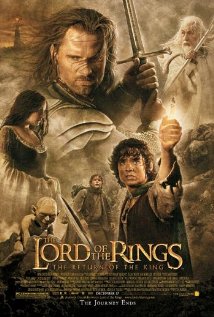Rating: 3½ stars (out of 4)
The Lord of the Rings: The Return of the King (2003): Dir. Peter Jackson. Written by Jackson, Fran Walsh, and Philippa Boyens. Based upon the novel of the same name by J.R.R. Tolkien. Starring: Elijah Wood, Sean Astin, Ian McKellen, Viggo Mortensen, and Andy Serkis. Rated PG-13 for intense epic battle sequences and frightening images. Running time: 201 minutes.
 As I come back to the last chapter in Jackson’s fantasy epic, I return with just a tad more knowledge of film history and technique, but not without my boyhood nostalgia. Easily one of the most ambitious film projects ever undertaken, Return remains the only overt fantasy film to win the big prize.
As I come back to the last chapter in Jackson’s fantasy epic, I return with just a tad more knowledge of film history and technique, but not without my boyhood nostalgia. Easily one of the most ambitious film projects ever undertaken, Return remains the only overt fantasy film to win the big prize.
Led by the guileful Gollum, two hobbits named Frodo and Samwise journey into the dark realm of Mordor, tasked with destroying a malevolent artifact. Meanwhile, their allies (led by a ranger, Aragorn, and a wizard, Gandalf) rally to defend the city of Minas Tirith, itself besieged by dark forces.
The film finds just the right tone, in that it takes itself seriously enough to make the emotional moments work, but not so seriously that we ever lose sight of the fun. Jackson’s love for the source material shines through in his attention to detail, but we also see him drawing upon his background in low-budget horror and cinematic tricks in general (like vertigo-inducing crane shots that make unreal locations even more unreal). Sometimes Jackson can’t quite help his excesses, but that also means we spend plenty of time with main and secondary characters.
Complementing fine craftsmanship is the special effects wizardry (pun intended). Landscapes and monsters feel fantastic and real simultaneously. And though we remember the phenomenal cast including Ian McKellen and Andy Serkis, I was reminded how good many of the smaller characters prove (watch how David Wenham as Faramir bids farewell to his unloving father, for what he thinks will be the last time). And I’m confident that Viggo Mortensen’s awe-inspiring speech during the final battle, in terms of composition and execution, will never find an equal.
Return more than plods in its final act, as if Jackson struggles to find a way to say goodbye to Middle-earth. That aside, it’s a miracle these films were made, or even funded for that matter. It stands as the culmination as the greatest realization of cinematic fantasy.
Next film: Million Dollar Baby, 2004